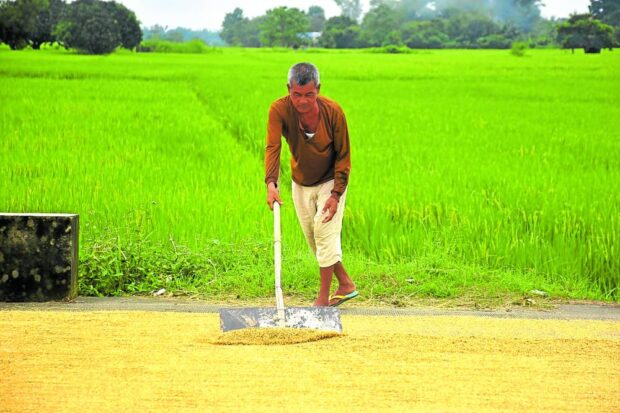
ROAD DRYING A farmer takes advantage of the good weather to dry palay (unhusked rice) on a section of the Pangasinan-Tarlac Road in the village of Bocacliw in Aguilar, Pangasinan, in this photo taken in August 2022. INQUIRER / WILLIE LOMIBAO
MANILA, Philippines — A proposal to institutionalize the provision of crop climate calendars and other information to farmers in a localized manner has been filed before the House of Representatives to ensure that farmland workers can cope with adverse weather conditions over the year.
In a statement on Wednesday, Bicol Saro Rep. Brian Raymund Yamsuan said that around 9.7 million farmers — around 708,000 of which are in the lawmaker’s home region — would benefit if House Bill (HB) No. 9129 or the proposed Climate-Resilient Agriculture Act is enacted.
According to Yamsuan, releasing crop climate calendars and other key information in English, Filipino, and the local dialect of an area would greatly help farmers in calculating their movements and making informed farming decisions.
“The traditional crop calendars distributed to farmers should be improved by coming up with crop climate calendars that would equip farmers with the knowledge they need to make informed decisions in helping secure the country’s food production amid the disruptions brought about by climate change on their planting and harvesting schedules,” he said.
“Institutionalizing the use (of) crop climate calendars can reduce the risk of crop losses and also assist farmers in determining how best to maximize the use of water and fertilizers in line with the country’s commitment to sustainable farming,” he added.
Aside from releasing information in different languages, HB No. 9129 also proposes tapping the Department of Agriculture (DA), the Philippine Atmospheric, Geophysical and Astronomical Services Administration (Pagasa), and even the Philippine Space Agency to craft a crop calendar for different agricultural areas.
“The [DA] shall establish and promote the use of crop climate calendars throughout the Philippines. In coordination with municipal, city, and provincial agriculturists, the DA shall implement a continuing program for all farmers and farmer’s organizations to formulate, use, and interpret crop climate calendars that are tailor-made for each specific locality or community,” HB No. 9129 stated.
READ: World leaders warn goals to fight hunger, poverty, climate change in peril
“[PhilSA] shall provide the DA relevant space data, including but not limited to satellite imagery, that would support the establishment and implementation of crop climate calendars throughout the Philippines. The [Pagasa] shall provide regular and up-to-date localized weather and climate information to city, municipal, and provincial agriculturist’s offices and directly to the farmers themselves through all available means of communication and information dissemination,” it added.
READ: Rice farmers tweak calendar to cope with climate change
These steps and measures, Yamsuan said, will help farmers harness technology to increase agricultural yield.
“The government should be able to catch up with fast-changing technological applications to enable our farmers to harness the power of space and science in developing innovative farming and adapting to the disruptions triggered by climate change,” he said.
“The use of crop climate calendars crafted with the use of the latest technologies is a significant first step in making our agriculture sector climate-resilient,” he added.